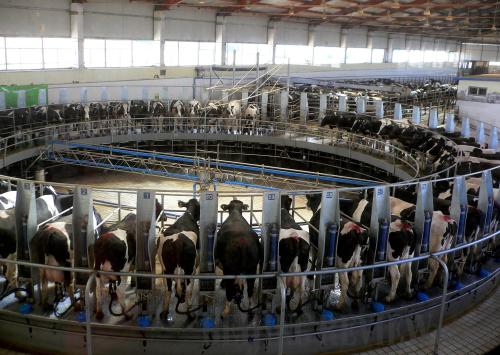|
 |
|
CLEAN PROCESS: Cows to be milked wait at a computerized milking parlor of the China Mengniu Dairy Co., the country's largest dairy producer in Inner Mongolia Autonomous Region, on December 10, 2010 (ZHANG LING) |
On June 4, the Ministry of Industry and Information Technology (MIIT) released an action plan to improve the quality of domestic infant formula. The plan outlined more efforts to tighten the supervision of producers.
It was followed by a joint circular released on June 20 by nine ministerial-level departments including the CFDA and the MIIT, which stipulates that baby milk powder producers should be certified according to the standards of pharmaceutical manufacturers.
Regulated as drugs, every batch of infant formula should undergo quality tests. Powders that are less than one month from the expiration date should bear a clear reminder of the expiration date or be taken off shelves, and import of milk powder within three months of expiration is prohibited.
The circular requires baby milk powder producers to maintain their own dairy farms. It also prohibits companies from outsourcing production, or repackaging and redistributing formula.
Unreliable milk sources were blamed for the melamine scandal in 2008, and turned many Chinese consumers to foreign brands or at least foreign-sourced milk powder. Yet some domestic producers are imitating foreign brands and tampering with labels during the repackaging and redistribution process.
"For companies without their own milk sources, it is very difficult to control the quality and safety of milk," said Chen Junshi, an academician with the Chinese Academy of Engineering Sciences and a research fellow with the China National Center for Food Safety Risk Assessment.
As part of its push for safer products, the government has encouraged mergers and acquisitions between dairy producers. The MIIT said on June 18 that integration of the milk powder industry is expected to involve 10 large companies with revenues exceeding 2 billion yuan ($326 million) in two years, accounting for 70 percent of the industry. It also said that it will not approve any new producers in the same period.
On the same day, China Mengniu Dairy Co., the country's largest dairy producer, offered to acquire Yashili International Holdings Ltd., in a $1.6-billion deal. The acquisition of China's eighth-largest formula producer, if successful, would be the largest ever in China's dairy industry.
Gao Fu, an MITT official, said that he expects to see that in two years, the top 10 domestic producers in the industry will supply more than 60 percent of all baby milk powder in China. Currently, their share of the total production is 43 percent.
Legal weapon
While ethics and administrative oversight are important to guarantee food safety, punitive legal measures are a strong deterrent to unscrupulous producers.
Criminal punishment is one deterrent, but administrative or civil punishments are used more frequently in food safety incidents, said Li Yuan, an official of the Legal Affairs Commission of the Standing Committee of the National People's Congress, China's top legislature .
In June, the CFDA announced at its website that it is soliciting feedback on an amendment to the Food Safety Law, and the amendment has been listed on this year's legislative schedule of the Legal Affairs Office of the State Council.
The law was enacted not long after the melamine scandal in 2008 and entered into force on June 1, 2009.
The law makes food safety a performance evaluation standard for local governments. In July 2009, the State Council released the Food Safety Law Implementation Regulation.
An amendment to the law is necessary because some articles of the law fail to keep up with industrial development, technology, and adjustments to the food safety regulatory system, according to a CFDA statement.
Shen Kui, Vice Dean of Peking University's Law School, said that the law should be amended to mete out even more punishment to violators, and in case of food safety incidents, the companies and their executives involved should be banned for life from the food industry.
Xu Jinghe, Director of the Legal Affairs Department of the CFDA, said that many people believe imposing harsher punishments is important to establishing the most stringent food safety supervision system.
"To ensure safety, the government should fulfill its supervisory duties, and companies should fulfill their social responsibilities. Industry self-discipline, public scrutiny and legal sanction are all necessary."
Email us at: tangyuankai@bjreview.com | 